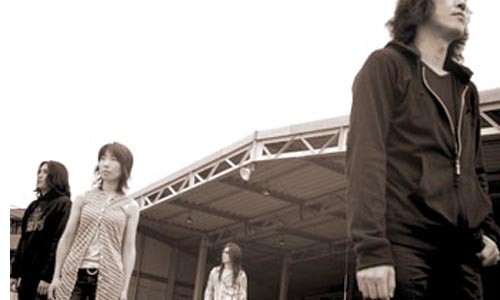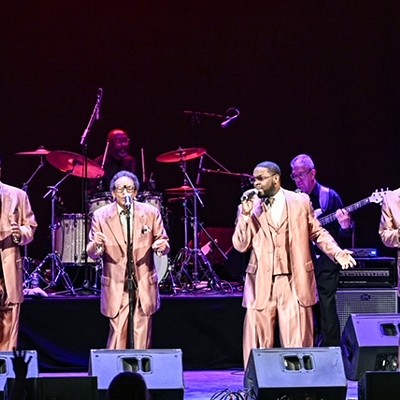Between musical progenitors Sunn O))) and Earth, a black hole named Boris churns forth entire galaxies of space-age psychedelic drone. Ransacking massive soundscapes to rearrange the constellations, tone by tone, Boris has become an unrelenting anomaly of the metal universe.
Three Japanese musicians merge into one pure vacuum of rock influence by absorbing every hyphenated, italicized and marginalized genre. Atsuo (drums), Wata (guitar) and Takeshi (bass) have fashioned a stellar compass of sounds since they first coalesced in 1992. Boris affords its members a sort of artistic invisibility, a singular tri-dentity capable of boundless experimentation. Last names are always withheld and song credits littered with intentional errors to further dissociate the music from its makers.
This makes for quite a concept album and Boris does nothing but. The musicians create tonal surprise while still keeping it downright analog in the studio. They named 2003's Boris at Last: -Feedbacker- after Takeshi and Wata's most cherished effects pedal, then used that very device to devise one album-long song of super-calibrated, electrified noise. Since its 1996 debut, Absolutego, Boris has probed this opus operandi with single-song LPs like Flood (2000) and Sun Baked Snow Cave (2005), its third co-production with "japanoise" legend Merzbow.
Boris even manipulates its own name (inspired by The Melvins' epic song) to suggest each album's sonic trajectory. When printed on the record sleeve in upper-case, "BORIS" denotes doom metal. "Boris," meanwhile, symbolizes an unpredictable brainstorming of rock's lower-case elements.
The latest "Boris" release, Rainbow, is a striking collaboration with Michio Kurihara, enigmatic guitarist for Japanese psych-mongers Ghost. At once mammoth and precious, the record moves like a shape-shifting force of nature, as narrated in existential Japanese.
Rainbow begins emerging from its black hole when Atsuo's sonorous refrains provoke a downpour of feedback over "Rafflesia." As the title track unfolds into beautiful conflict, Kurihara's rangy krautrock licks defile the moony rhythms. Jazzy interludes follow until "Starship Narrator" launches prismatic guitars into a stratosphere of foreboding fuzz, leaving traces of tempo for Boris to retrieve in the vaporous "Shine."
Thanks to Kurihara, the trio furnishes its trademark down-tuned drone with an almost angular momentum, generating metal tempered by melody. Rainbow breathes easier than most of Boris's heavily creased rock origami, yet still broods deeply with each breath before twinkling back into oblivion.
On tour, and aided by Kurihara and his frequent conspirators, Damon & Naomi, Boris will conjure its exquisite phenomena for Pittsburgh. Heads-up to star-gazers and shoe-gazers alike: Pitch your telescopes and haircuts, because neither enhances the view of a black-hole-spawning Rainbow.
Boris with Michio Kurihara and Damon & Naomi, and Phil Boyd & the Hidden Twin. 8 p.m. Thu., Oct. 4. Kelly-Strayhorn Theater, 5941 Penn Ave, East Liberty. $12 ($15 at the door). 412- 394-3353














